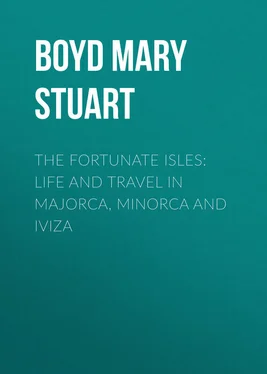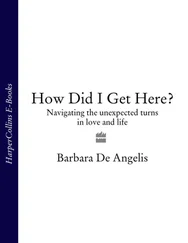Mary Boyd - The Fortunate Isles - Life and Travel in Majorca, Minorca and Iviza
Здесь есть возможность читать онлайн «Mary Boyd - The Fortunate Isles - Life and Travel in Majorca, Minorca and Iviza» — ознакомительный отрывок электронной книги совершенно бесплатно, а после прочтения отрывка купить полную версию. В некоторых случаях можно слушать аудио, скачать через торрент в формате fb2 и присутствует краткое содержание. ISBN: , Жанр: foreign_language, foreign_antique, foreign_prose, Путешествия и география, на английском языке. Описание произведения, (предисловие) а так же отзывы посетителей доступны на портале библиотеки ЛибКат.
- Название:The Fortunate Isles: Life and Travel in Majorca, Minorca and Iviza
- Автор:
- Жанр:
- Год:неизвестен
- ISBN:http://www.gutenberg.org/ebooks/39199
- Рейтинг книги:5 / 5. Голосов: 1
-
Избранное:Добавить в избранное
- Отзывы:
-
Ваша оценка:
- 100
- 1
- 2
- 3
- 4
- 5
The Fortunate Isles: Life and Travel in Majorca, Minorca and Iviza: краткое содержание, описание и аннотация
Предлагаем к чтению аннотацию, описание, краткое содержание или предисловие (зависит от того, что написал сам автор книги «The Fortunate Isles: Life and Travel in Majorca, Minorca and Iviza»). Если вы не нашли необходимую информацию о книге — напишите в комментариях, мы постараемся отыскать её.
The Fortunate Isles: Life and Travel in Majorca, Minorca and Iviza — читать онлайн ознакомительный отрывок
Ниже представлен текст книги, разбитый по страницам. Система сохранения места последней прочитанной страницы, позволяет с удобством читать онлайн бесплатно книгу «The Fortunate Isles: Life and Travel in Majorca, Minorca and Iviza», без необходимости каждый раз заново искать на чём Вы остановились. Поставьте закладку, и сможете в любой момент перейти на страницу, на которой закончили чтение.
Интервал:
Закладка:
The kitchen, which was the most picturesque part of the Hospederia, was looking particularly snug and cosy. A fire of logs burned on the open hearth, below the shining tin pans and the strings of red peppers, and lit up the fine bronzed faces of the carabineros , who sat close to its warmth.
They rose when we entered, to offer us their seats. One, spreading his striped blanket on the low settle, invited the Man to share it; and while I grilled the cutlets and Catalina washed dishes at the sink, the men chatted as freely as their difference of language would allow, the carabineros talking of their long hours of duty – for their patrol begins at five or six o'clock in the evening and does not end until seven next morning – and of the constant watch that has to be kept for smugglers on that lonely and seemingly scarce accessible coast.
Leaving them to resume their night watch, we supped and went to bed, to be roused in the early morning by voices. Netta, the house-mistress, had returned, and thenceforward the lively Catalina would relapse into the position of merely an obliging neighbour.
VIII
MIRAMAR
When we went downstairs to breakfast Netta was setting the table; setting it, too, after a fashion of her own which never varied, were the meal breakfast, luncheon or dinner.
First she spread the cloth, whose lack at luncheon on the previous day had so offended Catalina's sense of what was neat and proper. Then she put before each place a big tumbler, a little tumbler, two soup-plates, and a wooden spoon and fork.
Netta proved to be tall and nice-looking, with tragic dark eyes, and a gravity of manner that was in striking contrast to her husband's smiling bonhomie. She was an admirable housewife. We never caught her at work; yet, without the slightest appearance of fuss and flurry, she managed to keep everything the pink of perfection.
The weather was hardly promising. Rain had fallen in the night; veils of mist smothered the crests of the near hills and completely obliterated the more distant. But we were resolved to let nothing short of an actual downpour keep us indoors. And as the Man wished to sketch at Valldemosa, which had captivated us all on the previous day, the Boy and I accompanied him thither. Perhaps it is unwise to attempt to renew first impressions. Possibly the charm of Miramar clouded our eyes to the undoubted beauty of Valldemosa. More likely the fact that the sun only peeped out fitfully, and that the wind was damp and the sky sullen, influenced our view: but somehow Valldemosa seemed to have lost the glamour it cast over us when we first saw it basking in the warm sunlight. Everybody seemed chilly, and all the children looked as if they had colds in their noses.
Leaving the Man working at a water-colour of the old Carthusian monastery from rising ground above a covered well, we set off with the intention of augmenting our little stock of provisions from the shops of the town.
The store we chanced upon sold every likely and unlikely commodity, from green and orange boots to radishes. When we inquired where we might find a butcher, the shop-mistress, with a majestic wave of her hand, signed to us to follow her. And, walking in her footsteps, we threaded our way through an apartment, which was partly kitchen and partly an overflow stock chamber, into an inner room, where hung garlands of black and yellow sausages and the carcasses of two lambs.
This was the butcher's shop, she announced, and there was no beef, only lamb. So perforce we added yet more cutlets to our diet, and humbly craved bread. But the only loaves she had were so large that, rejecting them, we went in search of a baker.
In the less important Majorcan towns, shops are difficult to find. The fact that a tax is levied upon signs keeps all but the most prominent vendors from exhibiting one. The room of an ordinary house that opens directly to the street usually acts as the place of business; and a cabbage, or a basket of striped haricot beans, set casually on the doorstep, often serves to indicate the existence of a general shop.
After a little searching we succeeded in finding a panaderia , but the loaves of the baker, in place of being smaller than those of the grocer (which sounds Ollendorffian), were so huge that they resembled cartwheels, or, to be more exact, perambulator wheels, baked of rye.
For a moment the choice lay between possible starvation and the prospect of trundling the mammoth rye loaf up and down the three miles of highway that lay between us and the Hospederia.
While we hesitated, the baker lady, and the half dozen or so of her intimate friends who had followed us into the shop to see what the foreigners would buy, regarded us interestedly. Then a compromise suggested itself.
"Would it be possible to ask the señora to divide the loaf?"
"Yes – without doubt."
The complacent señora already had the large knife in her hand. So, clutching the half of the still steaming rye loaf, we returned to the Man, with whom we had arranged to share an open-air luncheon.
Before we had reached him, the mist that had been threatening to swoop down upon us resolved itself into a shower. Taking advantage of the near vicinity of the covered well, we boiled our tea-kettle under the archway, and drank tea, to the surprise of the people who were constantly coming to fill their water-jars.
Then, the sun consenting, rather sulkily, to peep out again, the Man returned to his work, while the Boy and I, feeling no further temptation to linger at Valldemosa, took up our section of the cartwheel and set off for Miramar.
On the way, not far beyond the outskirts of the town, we caught sight of a notice-board, which stated that a Museum of Mallorquin antiquities might be seen in a house on the side of the road nearest to the mountains. Following the path indicated, we found ourselves, after a few minutes walking, in the courtyard of what had evidently been a fine old country seat.
The doors stood open to the world. Except for a beautiful flock of cream-coloured turkeys, the place seemed utterly untenanted. There was no sign of humanity until the Boy woke the echoes by smiting lustily on a cow-bell that hung outside the kitchen door.
Then a little sun-dried old woman popped her head out, and with a scared face fled up a broad flight of steps that led from the courtyard to the floor above.
She had gone to warn the custodian of the Museum; and that dame, quickly appearing, invited us upstairs to see the collection.
The house, Son Moragues, she told us, was one of the many owned by the Archduke on the different estates he had bought. He had never used it as a residence, and merely kept it as a receptacle for the specimens of typical Mallorquin manufactures, such as pottery, models of baskets, furniture, etc., he was collecting.
The object that interested us perhaps more than any other exhibit was a jar that had been salved from the sea in Palma Harbour. Although a genuine antique it was of the shape in use to-day; and its unrecorded period of immersion had left it encrusted with a marvellous decoration of barnacles and shells.
What really delighted us most in the Museum were the views from the balconies; especially those obtained from a great old terras with a sloping floor, where we stood in the brilliant sunshine and watched the showers sweeping along the mountain tops and up the valley.
Down below us was a thick hedge of prickly pear, the edges of the fleshy leaves ruched with scarlet fruit. And beside us, as we leant on the edge of the balcony, was a wire tray on which a quantity of figs, gathered presumably from the trees in the field beneath, were drying in the sun.
The quaint old garden, which we saw on the way out, had tall box hedges and a spreading magnolia, and crumbling stone seats surrounded the fountain, whose waters have long run dry.
Читать дальшеИнтервал:
Закладка:
Похожие книги на «The Fortunate Isles: Life and Travel in Majorca, Minorca and Iviza»
Представляем Вашему вниманию похожие книги на «The Fortunate Isles: Life and Travel in Majorca, Minorca and Iviza» списком для выбора. Мы отобрали схожую по названию и смыслу литературу в надежде предоставить читателям больше вариантов отыскать новые, интересные, ещё непрочитанные произведения.
Обсуждение, отзывы о книге «The Fortunate Isles: Life and Travel in Majorca, Minorca and Iviza» и просто собственные мнения читателей. Оставьте ваши комментарии, напишите, что Вы думаете о произведении, его смысле или главных героях. Укажите что конкретно понравилось, а что нет, и почему Вы так считаете.











![John Bruce - The Lettsomian Lectures on Diseases and Disorders of the Heart and Arteries in Middle and Advanced Life [1900-1901]](/books/749387/john-bruce-the-lettsomian-lectures-on-diseases-and-disorders-of-the-heart-and-arteries-in-middle-and-advanced-life-1900-1901-thumb.webp)
